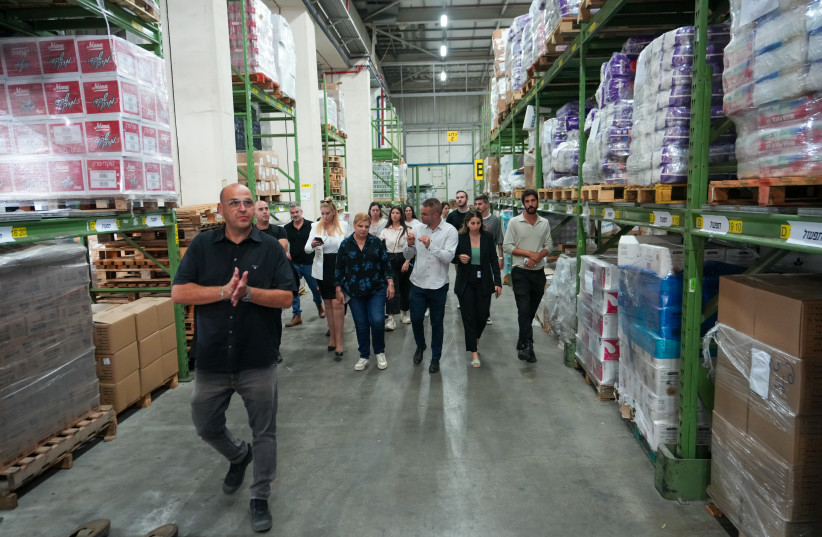Over the past five months, the amount of support the global Jewish community has given to Israel – financial, volunteering, and otherwise – has been unprecedented. In my role as the director of development at Colel Chabad, Israel’s oldest and largest continuously operating food security organization, I can say that the increased support I’ve seen firsthand is truly astonishing.
Recently, a mother from Brooklyn whose family had spent years saving around $50,000 for a home improvement chose to forgo the renovation and instead sent the money to help feed hungry people in Israel. There are hundreds of similar stories of people from around the world, each of whom with their own lives and concerns are going above and beyond to help their brothers and sisters in Israel.
However, despite all this, there is still a level of uncertainty surrounding how people can help, as well as a certain feeling of helplessness for those who don’t live in Israel. I’ve heard so often that people feel as if living in the Diaspora means they’re on the sidelines, while those on the frontlines in Israel are bearing the true cost and responsibility of this prolonged war. Others aren’t sure if their donation is really going to make a difference. To everyone who harbors a doubt or feels insecure about their ability to help, I share with them a message. For Am Yisrael, the frontlines are everywhere.
All support given to Israel, regardless of where it’s given, is going to the frontlines. All Israelis are one or two degrees separated from an active duty soldier or a victim of October 7. When a school in New York recently partnered with a school in Dimona and Netivot to supply backpacks and pair their students for Zoom calls with the Israeli students, they were helping the frontlines. Each of those students have parents, brothers, or sisters in the military, and helping them impacts the well-being of the soldiers defending our country.
Another important thing to consider is that when it comes to aid, the thought often counts just as much as the deed. Each dollar we send has an impact, not only financially, but also emotionally.

A parallel in our own religion is that when we send food to a shiva – a house of mourning – it is to show our support and care for the person in mourning, not necessarily because the mourner doesn’t have food to eat (although that is also the case far too often.) We send food because in doing so, the mourner feels our love, care, and support. Similarly, when Jews in Israel see that their family from around the world is sending donations, food, and coming to visit them, it means so much more than the material value of the help.
Donating “big ticket” items like medical equipment, a BBQ for the soldiers in Gaza, or military gear are clear-cut ways to help the frontlines. However, you don’t need to make a large or flashy donation to have an impact. You simply need to ask yourself, “In the position that God has currently placed me, how can I do my part to make a difference?”
The other day at a cafe in Jerusalem, someone I know paid for coffee and lunch for a soldier in front of her in line. That small act of kindness brightened the soldier’s day and is one small act among many that are keeping morale high for the Jewish people at this critical time.
The Rebbe, Menachem M. Schneerson of blessed memory, once said that “It’s the small acts that you do on a daily basis that turn two people from a ‘you and I’ into an ‘us’.”
Maimonides famously said, “He who saves one life, it’s as if he saved the entire world.” On a spiritual level, each act of kindness we do brings more light into the world, dispelling the forces of darkness.
Why I haven't visited the South yet
In recent months, many communal leaders, politicians, and social media influencers have viewed the destruction at Kibbutz Be’eri and other communities in Israel’s South. However, I myself haven’t gone and I don’t believe it’s necessary for most people to go. The reason I say this is not because it’s not important. It’s crucially important for people in positions of influence to bear witness to the events of that fateful Simchat Torah and share it with the world.
However, I believe that most people can do more good elsewhere. For people who are making the trip to Israel during this time of war, I suggest going to typical travel destinations and creating a sense of normalcy for regular people around the country. Tourism, one of Israel’s largest industries, has slumped drastically over the past six months. The emotional and economic impact of your trip to the Dead Sea, your visit to the Old City, your stay at Tel Aviv hotels, patronizing local shops, and eating at Israel’s restaurants is immeasurable.
For those who want to help, there are countless ways to get involved. In times of crisis, people still need food, clothing, and basic services. When October 7 happened, Colel Chabad was able to draw upon our experience to help service displaced families and victims of the attack. We hit the ground running to set up free pop-up clothing “shops,” mobile food pantries, food-delivery services, and providing displaced families with “food stamps” style gift cards to assist with food purchases. Much of our work is done by volunteers, and we appreciate any help that regular people can offer.
When our nation is gripped by the horrors of war, it’s easy to forget that the most important lesson is that it doesn’t matter where you live, what you do, or whether you make the trip to Israel.
With each action, large or small, you are helping the Jewish people; you are helping the frontlines.
The writer is the director of development at Colel Chabad. For more information, visit ColelChabad.org.
